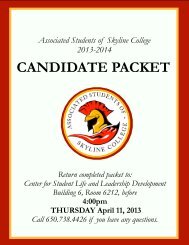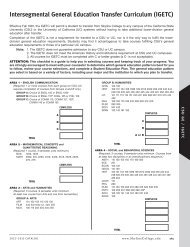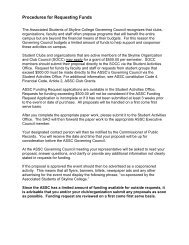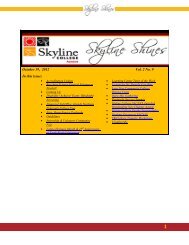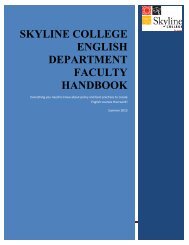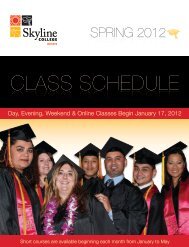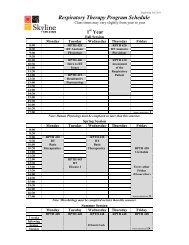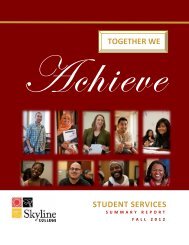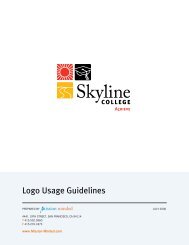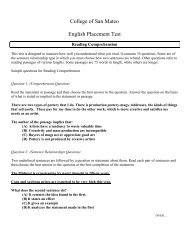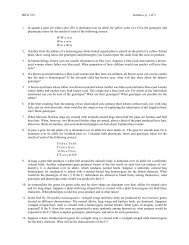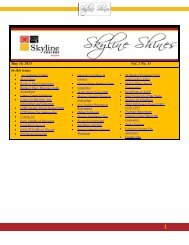Skyline College Catalog 2011-2012 Program & course descriptions ...
Skyline College Catalog 2011-2012 Program & course descriptions ...
Skyline College Catalog 2011-2012 Program & course descriptions ...
Create successful ePaper yourself
Turn your PDF publications into a flip-book with our unique Google optimized e-Paper software.
The Act also requires institutions to make available thecompletion or graduation rate of certificate or degreeseekingfull-time students. Persons seeking informationconcerning completion or graduation rates specified bythe Act should contact the Public Information Office,Building 1, Room 1318, (650) 738-4324, or view the informationon the web at http://www.smccd.edu/accounts/skypro/research4/srtkrate.html. Contact the Office ofAdmissions and Records, Building 2, Student ServicesCenter, (650) 738-4251, for additional information.More information about SRTK may be found on theCalifornia Community <strong>College</strong>s Chancellor’s Office websiteat http://srtk.cccco.edu/index.asp.ACADEMIC INTEGRITYAcademic dishonesty defrauds all those who dependupon the integrity of the <strong>College</strong>, its <strong>course</strong>s and itsdegrees and certificates. The college community has theresponsibility to make every reasonable effort to fosterhonest academic conduct.Academic dishonesty occurs when a student attemptsto show possession of a level of knowledge or skill that heor she does not possess. The two most common kinds ofacademic dishonesty are “cheating’’ and “plagiarism.’’Cheating is the act of obtaining or attempting to obtainacademic work through the use of dishonest, deceptive,or fraudulent acts. Plagiarism is representing the work ofsomeone else as his/her own and submitting it to fulfillacademic requirements.It is the student’s responsibility to know what constitutesacademic dishonesty. If a student is unclear about aspecific situation, he/she should speak to the professor.The following list includes, but is not limited to, some ofthe activities which exemplify academic dishonesty:Cheating:• Copying, in part or in whole, from someone else’stest.• Submitting work presented previously in another<strong>course</strong>, if contrary to the rules of either <strong>course</strong>.• Altering or interfering with grading.• Using or consulting any sources or materials notauthorized by the professor during an examination.• Committing other acts that defraud or misrepresentone’s own academic work.Plagiarism:• Incorporating the ideas, words, sentences, paragraphs,or parts of another person’s writing, withoutgiving appropriate credit, and representing the productas your own work.• Representing another’s artistic/scholarly works(such as musical compositions, computer programs,photo graphs, paintings, drawings, or sculptures) asyour own.• Submitting a paper purchased from a research orterm paper service.Other specific examples of academic dishonesty:• Purposely allowing another student to copy fromyour paper during a test.• Giving your homework, term paper or other academicwork to another student to plagiarize.• Having another person submit any work in yourname.• Lying to an instructor or <strong>College</strong> official to improveyour grade.• Altering graded work after it has been returned,when submitting the work for re-grading without theinstructor’s permission.• Removing tests or examinations from the classroomwithout the approval of the instructor.• Stealing tests or examinations• Having your work corrected for spelling or grammar(if contrary to the rules of the <strong>course</strong>).• Forging signatures on drop/add slips or alteringother <strong>College</strong> documents.Consequences of Academic Dishonesty:Academic and student disciplinary sanctions may beapplied in cases of academic dishonesty. Depending onthe seriousness of the infraction, you may:• Receive a failing grade on a test, paper, or examinationwhich may result in a lower <strong>course</strong> grade or failure in the<strong>course</strong>.• Have your <strong>course</strong> grade lowered, or possibly fail the<strong>course</strong>.Under the standards of Academic Sanctions and Disci -plin ary Sanctions, you may be subject to:• A warning• Temporary exclusion from an activity or class• Censure• Disciplinary probation• Suspension• ExpulsionThe Dean of Enrollment Services/Disciplinary Officermain tains a record of students who have engaged in academicdishonesty. This information is used to identify anddiscipline students who have been reported for academicdishonesty more than once.Student Appeals:In all instances, a student who has been subject to anacademic or disciplinary sanction has the right to appealthe decision of the professor or administrator in accordancewith established <strong>College</strong> due process procedures.Refer to Student Grievance and Appeals Policy in theStudent Handbook.R E S P O N S I B I L I T I E S / R I G H T S2 011 – 2 012 C A T A L O G w w w. S k y l i n e C o l l e g e . e d u43



